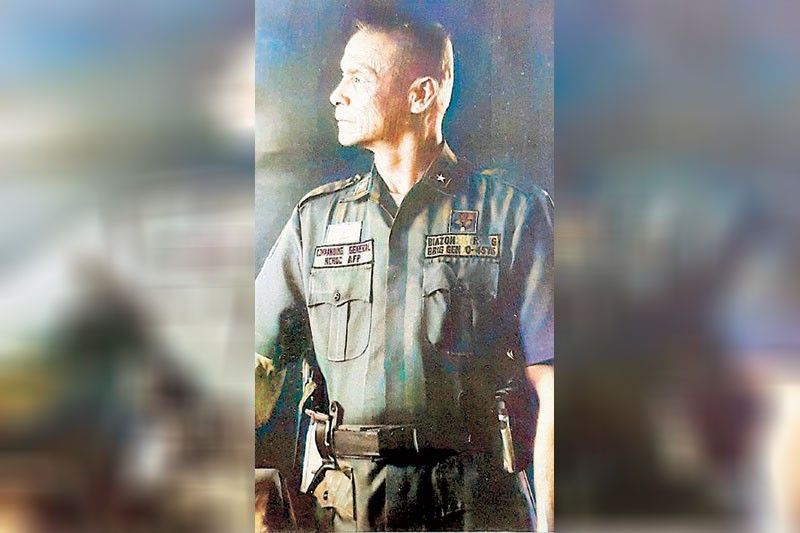Pong Biazon, soldier and statesman, 88

MANILA, Philippines — Former senator and military chief Rodolfo Biazon died yesterday, Independence Day, at the age of 88, his son Muntinlupa Mayor Ruffy Biazon announced.
The elder Biazon, Pong as he was fondly called, died after battling lung cancer for almost a year, having been diagnosed with the disease in July 2022 and undergoing treatment since. He was born on April 14, 1935.
“It is with deep sadness that we announce that the bell has rung and the last Taps has been sung for General Rodolfo Gaspar Biazon, former AFP Chief of Staff, member of the Philippine Senate and House of Representatives,” Ruffy posted on his Twitter account.
“It is perfectly fitting that today, Independence Day, at around 8:30 a.m., the soldier who dedicated his life and laid it on the line in defending freedom and democracy, has been set free from the pains of this world,” the mayor said. “This year, however, he caught pneumonia twice, the second being more serious than the first which had further weakened his lungs.”
“He courageously fought his last battle like a Marine would, but it is the Lord’s will which prevails. The family is grateful that we were able to spend his last moments with us intimately and peacefully. We send off a warrior and gentleman, secure in the knowledge that the faithful servant has fought the good fight and has finished the race,” he added.
He thanked everyone who had given “support, love and friendship to Papa during his active years and in the twilight of his life.”
Biazon was survived by his wife Monserrat Narag Bunoan and children Ruffy, Richie and Rino.
Staunchest defender
Senators are saddened by the death of former senator Biazon, whom they said would be remembered as “a great man of service who dedicated his entire life and career to Filipino people.”
Senate President Juan Miguel Zubiri saluted Biazon, saying “this is a bittersweet Independence Day, as the nation mourns the passing of senator Rodolfo Biazon, one of our staunchest defenders of the peace and democracy that we are enjoying today.”
Like Zubiri, Sen. Loren Legarda said she is “deeply saddened,” describing Biazon as a “true officer and public servant who dedicated his life to public service.”
“With the death of former senator Rodolfo Biazon we lost an exemplar soldier and solon,” Sen. Grace Poe said.
Sen. Risa Hontiveros recalled that long before she met Biazon in person, “I read about Sen. Pong in a 1981 Who magazine feature about his being a Marines commander in Davao. I remember being taken by his critical mind and his respect for human rights, qualities essential for an officer and a gentleman.”
Senators Bong Revilla and Jinggoy Estrada also expressed their heartfelt condolences to those left behind by Biazon.
Former Senate president Franklin Drilon said, “A patriot has fallen. In his lifetime, Sen. Pong Biazon always stood, and fought, for what is right for our country. He fought a good fight. Like an old soldier, General Biazon will never die, he will just fade away.”
At the House of Representatives, Speaker Martin Romualdez paid tribute to Biazon, saying “a brave soul has been summoned back to God’s army on a day that we Filipinos associate with bravery. That is a fitting tribute to Pong Biazon by the Almighty, telling us to emulate the great Filipino that he was.”
Biazon was a House of Representatives member from 2010 to 2016.
Expressing its deepest sympathies, the Department of National Defense (DND) described Biazon as one of former president Corazon Aquino’s bravest military men who defended her administration against several coup attempts after the EDSA people power revolution.
A native of Batac in Ilocos Norte, Biazon is known as the first military general from the Philippine Marine Corps of the Philippine Navy to become an AFP chief.
“Throughout his decades-long service to the Filipino nation, Sen. Biazon embodied patriotism, integrity and commitment to the protection of the country’s freedom and its democratic institutions,” the DND said in a statement.
Professional training
Despite having passed the examinations at West Point and the US Naval Academy, Biazon chose to enter the Philippine Military Academy in 1957.
He was the class goat – the cadet who graduates last – of PMA Class 1961. Yet, this did not prevent him from excelling – becoming superintendent of PMA in 1986-87, commandant of the Philippine Marines in 1987-89, commanding general of the NCR Defense Command in 1988-90, Armed Forces of the Philippines (AFP) vice chief of staff in 1990-91 and AFP chief in 1991.
The most remarkable event of his life as a soldier was when he was assigned to Davao in 1983. It was there when he won back the trust and confidence of the civilians in the military who were then perceived by the people to be oppressive and abusive.
Biazon attended other training or schooling which include the TOP Management Program at the Asian Institute of Management; Command and General Staff Course in Quantico, Virginia, USA; Crisis Program in California; Allied Combat Intelligence Course in Okinawa, Japan; Senior Officer Maintenance Course in Kentucky; Amphibious Warfare Course in Quantico, Virginia and Military Instructors in Norfolk, Virginia, USA.
He became senator in the Ninth Congress from 1992 to 1995. He was again elected senator from 1998 to 2004. He served as chairman of the Senate committees on national defense and security and on urban planning, housing and resettlement.
As senator, Biazon authored several laws that include Republic Act 9208 (Anti-Trafficking in Persons Act of 2003), RA 9161 (Rental Reform Act of 2002), RA 7835 (Comprehensive and Integrated Shelter Finance Act) and RA 7898 (Modernization of the Armed Forces of the Philippines).
Humble beginnings
Biazon’s father Rufino Biazon was a dough maker while his mother Juliana Gaspar was a clothes washer. His father died when he was seven years old and left him with his mother and three younger sisters.
At the young age of eight, he and his sisters had already experienced great hardship, especially during the Japanese regime. Like any other poor family during those times, the Biazons had to work very hard to make ends meet.
Living in a makeshift shanty in Cavite, they had to peddle food and collected bottles and newspapers, which were later sold in order to earn a living for the family. But this poverty did not stop him from obtaining his education.
He enrolled as a Grade 1 student at the age of eleven in 1946. He went to school in the morning and worked in the afternoon to support his education, and at the same time look for ways to earn money to feed the family.
He would collect seashells in Manila Bay, which were sold at the market. He studied in Pasay City’s Jose Rizal Elementary School, where he graduated salutatorian.
He continued working, washing clothes for people in order to sustain his high school education at the Jose Abad Santos High School, where he also graduated with honors. — Delon Porcalla, Michael Punongbayan
- Latest
- Trending































